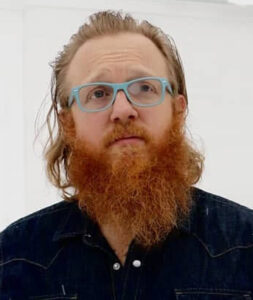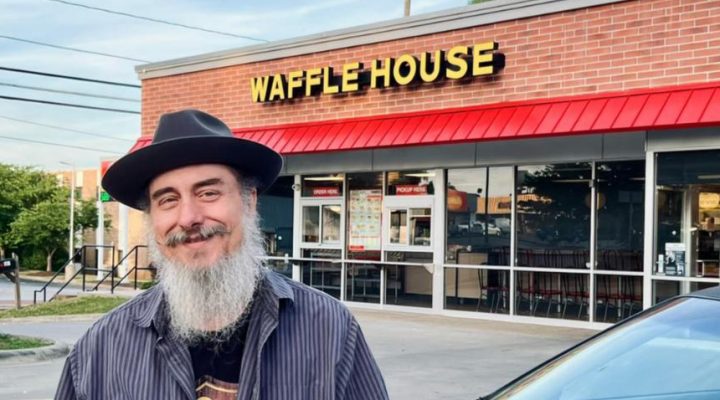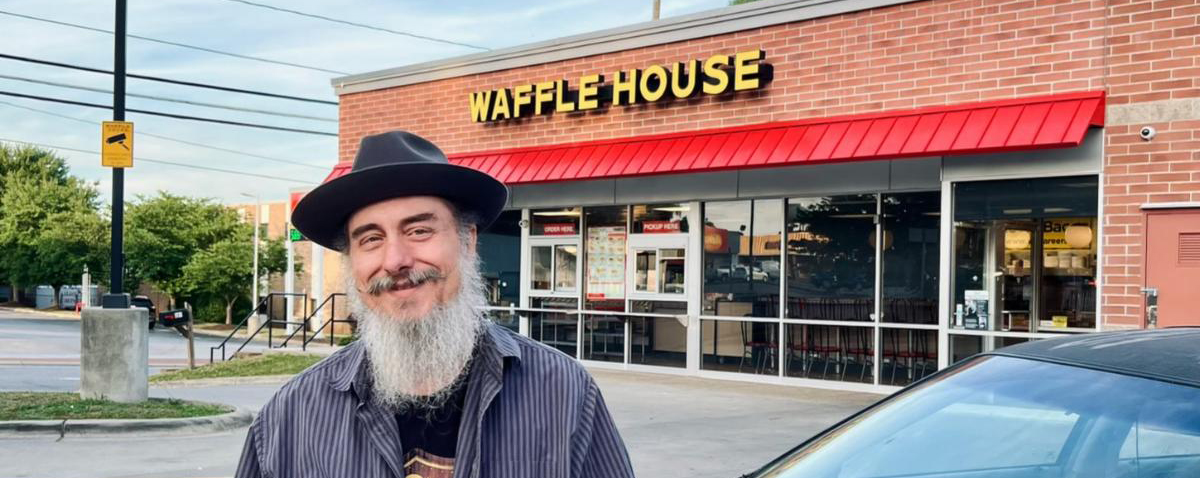In the first chapter of The Glad River, author Will Campbell introduces two main characters, Claudy “Doops” Momber and Kingston Smylie. Flung into the cold military-industrial machine, the men first cross paths during basic training.
Be it the impending war, or the need for authentic connection, they waste no time on small talk. Kingston opens up immediately and shares a revealing personal story about his upbringing. Exposed to a level of intimacy he isn’t quite ready for, Doops is left both intrigued and taken aback by the suddenness of Kingston’s vulnerability. A bond forms, linking the two in ways only a lifetime of proximity to another soul can do.

Justin Cox
Doops senses this and starts the following dialogue:
Doops put his hand on the man’s shoulder and turned him around, looking directly into his eyes. “Do you trust me, Kingston?”
“Yes. I trust you, Doops. Do you trust me?”
“Yes. I trust you.” They stood shaking hands again, looking each other squarely in the eyes.
“Then we are buddies?” Kingston asked. Neither face showed any expression.
“Yes. We are buddies. I’m your buddy.”
“Are you my friend?”
“Friend?” Doops replied. “Friend.” He repeated the word but no longer as a question, his voice dropping. “That’s a stronger word. We’ll have to see. But we’re neighbors. Like I say, we’re neighbors. I know that much.”
Don Durham and I became neighbors over plates of Indian food in the summer of 2016. We became neighbors after a mutual friend thought it a good idea for us to know one another. I, a soul-searching “seeker” who was uncomfortable with being called a Baptist. Don, a bridge-burning nonconformist who had left the comfy position as president of the Cooperative Baptist Fellowship Foundation to farm and give away food.
The Don I met was several years removed from the mover and shaker who wore suits and carried a copy of the Wall Street Journal under his arm. Others can and have testified of that Don’s existence.
“He didn’t so much march to a different drum as he unburdened himself of the drum altogether.”
My Don was longhaired, bearded and sported bibbed overalls. He’d already traded in the slow-moving wheels of denominational life for the slow-but-life-giving tires of an old tractor where tinkering with the latter tended to produce more than the former. This Don was unfiltered and edit-free. No longer tethered to an institution, he didn’t so much march to a different drum as he unburdened himself of the drum altogether. Our states of perpetual dissension made us prone to find one another.
As we swapped backstories that day, I remember our food arriving. We shot each other looks trying to get a sense of who would bless the curry. It was Don who raised his fork in one hand, and as I recount the memory with all the tempting beauty nostalgia offers, a ray of sunlight streamed down through the windows, illuminating his head, making it appear as if the heavens had opened and God almighty herself had kissed the crown of his pony-tailed head. The unfolding scene produced a saintly halo around Don, making him a living and breathing icon an arm’s length away from me.
My sanctimonious vision was cut short when he offered an authentic set of words that immediately solidified our bond. Words I interpreted as heartfelt and holy. He hit me with, “Well, hell, Justin. I’m thankful for all this,” while motioning to the food and me, his present company.
I knew instantly he meant what he said, but I wasn’t aware this was the first prayer of a future friend. I wasn’t aware of how much his words would change my life in the coming years.
And I didn’t know the text I received from him earlier this month, informing me of his plans to attend my installation service, would be the last words I’d ever get from him.
“I mourned for the times we had and the ones on layaway.”
It was late at night when I received news of Don’s passing. It was one of those phone calls you hope is a mistake. The voice on the other end of the line was reliable, yet, I still could not believe it. Through spells of numbness, I sobbed. I mourned for the times we had and the ones on layaway.
Like many going through grief, I experienced a level of denial. Surely the news couldn’t be true. I resisted mentioning his name for the next few days. Hoping if I didn’t speak it, Don would somehow reappear, quipping like Mark Twain that “rumors of his demise had been greatly exaggerated.”
When Sunday morning came, an urge overtook me as I began to dress for just my second service at a new faith community. My usual garb didn’t seem fitting, so I slid into my Round House overalls with a dress shirt whose pattern resembled a farmer’s handkerchief. No tears from behind the pulpit as I shared with the congregation the reason for my attire. I told them I did so to honor a friend.
“In a sea of warm hellos, I stood trying to say farewell to a person I’m not ready to let go of yet.”
Maybe I was finally becoming a tactician practicing his trade. Or maybe I just didn’t have any more tears left to give. It was “Welcome Back Sunday,” after all, at Second Baptist Church, and in a sea of warm hellos, I stood trying to say farewell to a person I’m not ready to let go of yet.
How do you say goodbye to a neighbor, a friend, or a brother? One who has journeyed further down the path than you? What does one say as they begin to realize all the things they never said?
I wish I could tell him how proud I was of him.
I wish I could tell him how much I loved him.
Some might call it harboring regrets.
Regrets are often labeled as something worth letting go of. But there’s something to pining for another chance at a missed opportunity. Folks regret because they care. We long for a chance to get one more word in. One more sit-down.
Or, in the case of Don and me, one more wisdom-filled chat tucked away under the warm lights at a Waffle House counter.
My regrets rest in such places.
I find myself squeezing all those pangs of conscience into those faux-wood, burnt orange, cushioned booths. This is where Don and I used to share raisin bread and pieces of ourselves. Giving as much as we both gave. Realizing as we did, there were always some things we kept for ourselves. Holding back for other conversations with different people.
Don would introduce himself on the Bible Bash Podcast he co-hosted as a “hermit-like farmer and cantankerous curmudgeon.” And I suppose those labels stick with enough spit and grit clinging to them.
But I have to call bullshit on them too. A fact I know Don would appreciate.
“He lived on the fringe, but his circles were many.”
He was a hermit who loved company. A curmudgeon who loved people. I knew this before I read the words of others about him. I knew this before I received messages from friends and acquaintances who were part of the vast constellation of relationships Don hung in the skies of his own making. You see, Don created worlds with and for people. Sometimes you’d almost forget the standoffish S.O.B. cared for others as much as he did you. He lived on the fringe, but his circles were many.
In the final pages of The Glad River, Doops and Kingston lay to rest a third friend, Fordache Arceneau. Saying their own farewells, Doops offers: “What the Giver gave freely, we now return. Without apology for the grudge. We will long harbor and nourish the grudge. Not against the Giver. But against this day and its foolishness.”
Dammit, Don. I could empty a tankard of ink on you and still not capture what you meant to me. We talked about what mattered and what didn’t. We shared hard truths and told beautiful lies. You laughed when I told you I saw myself having a hard go in congregational ministry. “I’m glad you’re figuring that out now,” was your reply.
We talked of the South, of Appalachia and the food served on our family tables. You talked a lot of what I knew little of and listened when I decided to chime in. You asked me point blank if I knew who Will Campbell was, and when I shook my head no, you instructed me not to tell anyone I was a Baptist until I did.
I lived for the times during our conversations where you’d let go with a string of “right, right, right” followed by a hearty chuckle. We critiqued the empire and painted those who upheld it with colorful words. We talked about “our people.” Those we walked with, discovered and left behind. We listened to music and read books and shared our thoughts. We touched on the precious gift of family. We talked about the future, not knowing it would get away from us. All these things we did.
But most of all, I believe we just loved one another because we were friends.
I’ll keep watch over “the neighborhood,” brother.
I’ll keep watch until I catch up with you further down the path.
Justin Cox received his theological education from Campbell University and Wake Forest University School of Divinity. He is an ordained minister affiliated with the Cooperative Baptist Fellowship and enrolled in the doctor of ministry program at McAfee School of Theology. Besides reading, spending time in the kitchen and amateur gardening, Justin spends time with his spouse, Lauren, and their two daughters. He began his tenure as senior pastor of Second Baptist Church in Suffield, Ct. in August. Find his ramblings at blacksheepbaptist.com.


